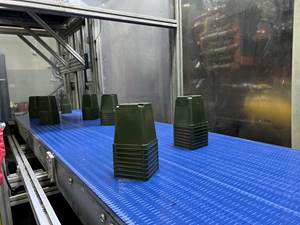Novel Line Turns Fluff to Blown Film
Processor Bioflex of Mexico is utilizing Reifenhäuser Blown Film’s EVO Fusion technology to integrate postindustrial and postconsumer recycled materials into products.
At an open house event held at Bioflex’s facilities in Mexico, Reifenhäuser Blown Film showcased for the first time in the Americas one of its latest technological advancements — EVO Fusion. This line aims to reshape the landscape of film processing with more sustainable and efficient production methods.

Jose Lozano, Bioflex General Director, and Ulrich Reifenhäuser, Reifenhäuser Group general director. Source: PT
Reifenhäuser says EVO Fusion technology is set to shift paradigms in the industry. Traditionally, the use of postconsumer recycled materials (PCR) in film production has faced challenges due to quality inconsistencies. PCR quality can vary significantly between batches due to the heterogeneous mix of plastic types and the constant presence of impurities.
Notes Dr. -Ing. Christoph Lettowsky, technical manager of Reifenhäuser’s Blown Film Unit: “The first batch may be good, but the second or third might not be.” These inconsistencies have historically led to processing difficulties and final products that could not compare to those made from virgin materials.
EVO Fusion system processes postindustrial recycled materials (PIR), enabling the recovery of production floor waste such as barrier films with printing and lamination.
However, EVO Fusion addresses these challenges by reducing dependency on material quality. It enables efficient use of PCR, even from low-quality plastics derived from postconsumer waste, integrating them directly into the production process without pelletization. This capability not only broadens the range of applications but also reduces energy costs by up to 40%, significantly enhancing both the economic and environmental appeal of using recycled materials.
In addition, the EVO Fusion system processes postindustrial recycled materials (PIR), enabling the recovery of production floor waste such as barrier films with printing and lamination. These materials can be fed directly into the shredder, cut into small pieces or fluff, and added directly to the EVO Fusion twin-screw extruder. The ability to add these wastes directly into the extruder without prior pelletization streamlines the process and further reduces the environmental footprint.
By facilitating the use of recycled materials in high-quality film production without traditional cost and energy barriers, these technologies make adopting sustainable practices both feasible and profitable for film manufacturers.
Reifenhäuser’s twin-screw technology is said to improve mixing and degassing to remove impurities and unwanted components, thereby enhancing film quality.
It is also worth noting that as sustainability reshapes market expectations, there is growing acceptance of recycled films. What was once deemed undesirable due to aesthetic considerations is now becoming a hallmark of environmental commitment. Both brands and consumers increasingly value the “recycled look,” which visibly communicates a commitment to environmental stewardship.
According to Ulrich Reifenhäuser, director of Reifenhäuser Group, the plastics and recycling industries will soon become one interconnected sector. The market urgently needs to facilitate the integration of recycled materials across all processes and markets. EVO Fusion stands out as a technology that aims precisely in this direction.
Bioflex in Mexico: A First for the Americas
Bioflex, a flexible packaging manufacturer based in Leon, Guanajuato, is a pioneer in implementing this technology in the Americas. During the Open House, the company demonstrated the EVO Fusion extrusion technology for processing PIR directly in fluff form, without pelletization. Before having the EVO Fusion, these materials were used to manufacture pallets, trash bins and plastic containers. Now, this extrusion and conversion process waste is used to produce high-quality polyethylene (PE) film with recycled content.
With this technology developed by Reifenhäuser, Bioflex positions itself as a trailblazer in the Americas by directly integrating recycled material into film production for various industries and products. This process not only redefines the use of recycled resources but also drives a shift toward a circular economy, promoting the reintegration of materials into their original value chain.
“This technology not only symbolizes innovation for Bioflex but also sets the course for a more responsible and conscious industry model.”
Michelle Voss Díaz explains the benefits obtained since the installation of EVO Fusion Line.
Michelle Voss Díaz, sustainability director at Bioflex, described the transition to this technology as a journey of discovery and continuous learning. “Introducing an innovative approach to the use of recycled materials required operational adjustments and a mindset shift. However, thanks to initial trials with customers and technical support from Reifenhäuser Blown Film, the transition has been smooth and promising,” she notes. This adaptation was not only technical but also cultural within the company, underscoring a genuine commitment to sustainability at all operational levels.
Furthermore, the market’s reception of products manufactured with EVO Fusion has been significantly positive. “Customers who have tested films produced with EVO Fusion not only praise the technical quality of the product but also value the added benefit of incorporating recycled materials into its composition,” Voss Díaz says. “This balance between functionality and sustainability has generated trust and reaffirms Bioflex’s vision that it is possible to offer responsible solutions without compromising performance. This initial success serves as critical validation for Bioflex and inspires continued progress toward a circular economy.”
Related Content
Processor Turns to AI to Help Keep Machines Humming
At captive processor McConkey, a new generation of artificial intelligence models, highlighted by ChatGPT, is helping it wade through the shortage of skilled labor and keep its production lines churning out good parts.
Read MoreImpacts of Auto’s Switch to Sustainability
Of all the trends you can see at NPE2024, this one is BIG. Not only is the auto industry transitioning to electrification but there are concerted efforts to modify the materials used, especially polymers, for interior applications.
Read More3D Printed Spine Implants Made From PEEK Now in Production
Medical device manufacturer Curiteva is producing two families of spinal implants using a proprietary process for 3D printing porous polyether ether ketone (PEEK).
Read MoreNPE2024 Wrap-Up: Sustainability Dominates Show Floor News
Across all process types, sustainability was a big theme at NPE2024. But there was plenty to see in automation and artificial intelligence as well.
Read MoreRead Next
See Recyclers Close the Loop on Trade Show Production Scrap at NPE2024
A collaboration between show organizer PLASTICS, recycler CPR and size reduction experts WEIMA and Conair recovered and recycled all production scrap at NPE2024.
Read MoreBeyond Prototypes: 8 Ways the Plastics Industry Is Using 3D Printing
Plastics processors are finding applications for 3D printing around the plant and across the supply chain. Here are 8 examples to look for at NPE2024.
Read MoreMaking the Circular Economy a Reality
Driven by brand owner demands and new worldwide legislation, the entire supply chain is working toward the shift to circularity, with some evidence the circular economy has already begun.
Read More













